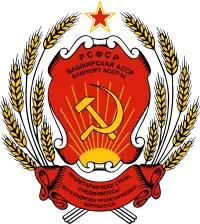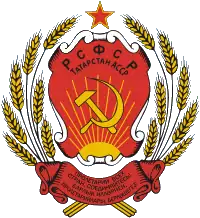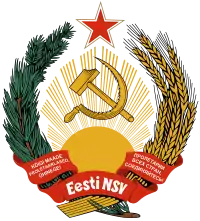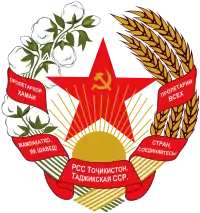Supreme Soviet
The Supreme Soviet (Russian: Верховный Совет, Verkhovny Sovet, English: literally "Supreme Council") was the common name for the legislative bodies (parliaments) of the Soviet socialist republics (SSR) in the Union of Soviet Socialist Republics (USSR). These soviets were modeled after the Supreme Soviet of the USSR, established in 1938, and were nearly identical.[1] State-approved delegates to the Supreme Soviets were periodically elected unopposed in show elections.[2] The first free or semi-free elections took place during perestroika in late 1980s, in which Supreme Soviets themselves were no longer directly elected. Instead, Supreme Soviets were appointed by directly-elected Congresses of People's Deputies based somewhat on the Congresses of Soviets that preceded the Supreme Soviets. The soviets until then were largely rubber-stamp institutions, approving decisions handed to them by the Communist Party of the USSR or of each SSR.[2] The soviets met infrequently (often only twice a year for only several days) and elected the Presidium of the Supreme Soviet, a permanent body, to act on their behalf while the soviet was not in session.[3] Under the 1936 and 1977 Soviet Constitutions the Presidium of a Supreme Soviet served as the collective head of state of its republic.[4] The Supreme Soviets also elected Councils of Ministers (Councils of People's Commissars before 1946), an executive body. After the dissolution of the USSR in late December 1991, most of these soviets remained the legislatures of independent countries until Armenia, Azerbaijan and Kazakhstan abandoned the system in 1995.
Supreme Soviets of the Soviet Republics
Soviet Republics dissolved before the dissolution of the Soviet Union
Supreme Soviets of the Autonomous Soviet Republics
| Soviet Republic | Supreme Soviet | Established | Disbanded | |
|---|---|---|---|---|
 |
Supreme Soviet of the Bashkir ASSR
БАССР Юғары Советы |
1938 | 1993 | |
 |
Supreme Soviet of the Tatar ASSR
ТАССР Югары Советы |
1938 | 1990 | |
.svg.png.webp) |
Supreme Soviet of the Tuvan ASSR
Тыва АССР-ниң Дээди Соведи |
1961 | 1993 |
References
- Where nation-states come from: institutional change in the age of nationalism by Philip G. Roeder, p. 70
- Perestroika-era politics: the new Soviet legislature and Gorbachev's political reforms by Robert T. Huber and Donald R. Kelley, p. 52
- Russian law: the end of the Soviet system and the role of law by Ferdinand Joseph Maria Feldbrugge, p. 192
- Armstrong, John Alexander (January 1, 1978). Ideology, Politics, and Government in the Soviet Union: An Introduction– Google Knihy. ISBN 9780819154057. Retrieved 2016-11-26.


.svg.png.webp)







.svg.png.webp)




